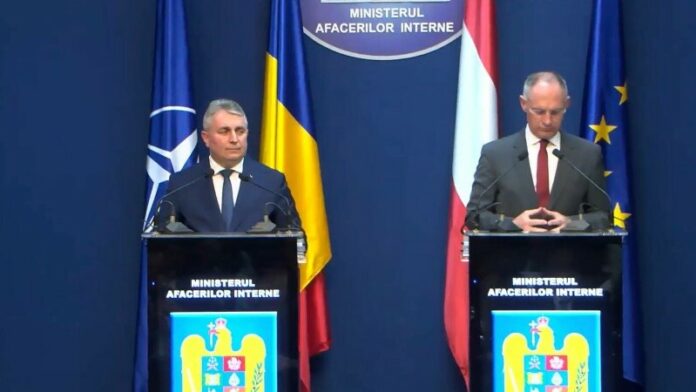Austrian Interior Minister Gerhard Karner said during a meeting with Romanian counterpart Lucian Bode on Wednesday that he cannot offer an exact date for when his country will lift its veto on Romania joining the Schengen Area, Euractiv reports.
In December, Austria blocked Romania and Bulgaria from joining the visa-free Schengen zone, with Austrian Chancellor Karl Nehammer claiming that many unregistered migrants or asylum seekers are entering Austria via those countries – a move strongly criticised by other EU countries.
But during a meeting with Romanian Interior Minister Lucian Bode in Bucharest, Karner rejected Romania’s request that Austria provides a date for when it would lift its veto.
“I tell you very openly: from my side, I cannot give you a date today. First of all, I want us to get results so that the EU is protected in the area of external borders,” Karner told Bode.
While Romania aims to join the Schengen Area by the end of the year, Karner did not provide any specific steps that the country should take to achieve this, nor a specific timeline for when the Schengen blockade would be lifted.
“We are currently still very far away from the system working,” Karner said on Wednesday, APA reported. This is something Germany also have admitted when it extended border controls with Austria three weeks ago despite continuing its Bulgaria and Romania to join Schengen, Karner added.
“I am not fighting against Romania or the Romanian Interior Minister, Lucian Bode, but together we are fighting to make the system work,” he stressed.
“The system does not work, and our bilateral interest is to see this system start to work with functional external borders,” Karner added, referring to controls at the German-Austrian and Franco-German borders despite checks being conducted at Romania’s external borders.
Bode stressed that Karner’s visit to Romania had improved previously strained relations but emphasised the need to balance rights and obligations in the EU. Romania should not only fulfil obligations without enjoying rights, he added.
Meanwhile, Karner praised bilateral cooperation against traffickers and noted the need for the European Commission to fortify external border protection.
“We can create alliances at the European level to put pressure on the European Commission to improve the internal security system,” said Karner, noting that Austria and Romania are “partners”, which, together, can pressure the European Commission to protect the EU’s external borders.
Romania understands Austria’s concern regarding managing irregular migration “very well”, said Bode, noting its active involvement in fighting the phenomenon at bilateral and the EU level.
“Romania is part of the solution, not of the problem”, Bode said, adding that Romania should join Schengen in 2023.
At the meeting, Karner and Bode signed an action plan to combat irregular migration, including establishing joint Hungarian-Austrian patrols at the Nădlac II Border Crossing Point, consolidated cooperation at the Oradea Contact Point near the Hungarian border, and the management of irregular migration on the eastern-Mediterranean route.
It was agreed that Austrian police officers on duty at Hungary’s borders with Romania and Serbia would, in future, also be able to carry out joint patrols in the area of the Romanian border crossing Nadlac in the border triangle.


